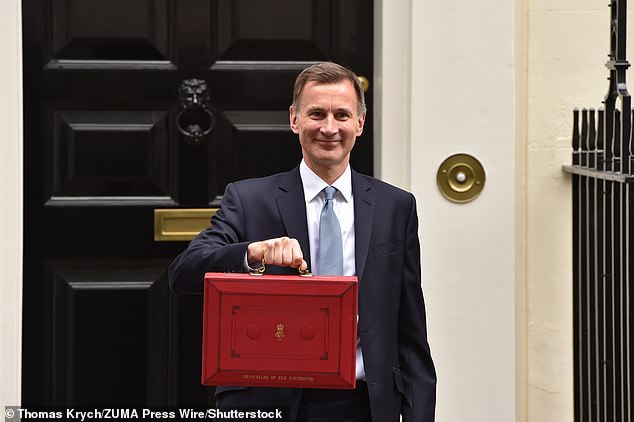Chancellor Jeremy Hunt is expected to cut National Insurance contributions by 2p in the Spring Budget tomorrow.
It comes just months after another 2 percentage point cut to National Insurance (NI) took effect in January, following an announcement in the Autumn Statement.
There had been some expectation that Hunt might cut income tax in what is expected to be the last Budget ahead of the general election.
We explain why the Chancellor has set his sights on cutting National Insurance and what benefit it will bring to workers.

Chancellor Jeremy Hunt is widely expected to cut National Insurance by 2p in the Budget
Who will benefit from a cut to National Insurance?
National Insurance (NI) is a tax on earned income and is paid by employees and self-employed workers.
The amount of NI contributions paid will depend on how much you earn and your personal circumstances.
Currently employees pay 10 per cent on income of £12,570 to £50,270, after a 2p cut to NICs which came into effect in January.
Hunt also made changes to the rates paid by the self-employed.
From 6 April, the main rate of Class 4 self-employed NICs will be cut from 9 to 8 per cent and Class 2 self-employed NICs will be abolished entirely.
A cut to NI will therefore mirror the effect of an income tax cut and boost take-home pay, but it will not have any impact on those above the state pension age who do not pay NI.
However, in the Autumn Statement, the Chancellor confirmed that pensioners will see their state pension rise by 8.5 per cent thanks to the triple lock.
Laura Suter, director of personal finance at AJ Bell said: ‘The move will also help to quell some of the claims of generational unfairness as those on the state pension are likely to be handed another meaty increase through the triple-lock.
‘As Jeremy Hunt has already made cuts to National Insurance, he could also point to the overall tax saving for individuals from the combined cuts – offering up a juicier headline to win over voters.’

A 2p cut to National Insurance contributions will save an average worker £25 a month (Figures from Evelyn Partners)
Why is Hunt going to cut National Insurance again?
Tax cuts have been widely rumoured since the Autumn Statement.
Millions of workers have been hit by rising taxes which have risen to their highest level since records began 70 years ago, according to the Institute for Fiscal Studies.
However cutting taxes can be pricey. While Conservative backbenchers have called for income tax to be slashed, it is estimated to cost the Treasury £13.7billion to implement a 2p cut.
The cost of cutting national insurance by 2p by comparison is approximately £10billion a year.
The Times reported that Hunt and Rishi Sunak decided against cutting income tax after the Office for Budget Responsibility downgraded the amount of fiscal headroom available for tax cuts.
There were also concerns that a cut to income tax could be inflationary and the latest reading still had CPI higher than the Bank of England’s 2 per cent target.
How a 2p tax cut will affect your take home pay
Another cut to NI will be welcomed by workers who will see another small rise in their monthly take-home pay, following on from the 2p cut that arrived in January.
A 2p cut would amount to an extra £149 a year – or £12.42 a month – for someone earning £20,000, according to figures from Evelyn Partners.
While someone earning £30,000 would have £309 more a year, or £29.08 a month.
Those earning £40,000 will be £549 better off, while higher and additional rate taxpayers will save £754 a year.
The median employee earning £28,000 a year would receive £309 – or £25.75 a month.
This, paired with the 2p cut that was introduced in January, might constitute a big tax cut for workers but will not benefit those who pay income tax but not NIC.
The decision to keep tax thresholds frozen at their current level means that many taxpayers will not see much benefit to their take-home pay.
Uprating the current thresholds with inflation would actually have a bigger impact on take-home pay than NI and Income Tax entirely for some taxpayers.
Keeping the thresholds in line with September’s CPI reading of 6.7 per cent would increase the personal allowance from £12,570 to £13412 and raise the higher-rate tax threshold from £50,270 to £53,638.
Anyone earning higher than this revised higher rate threshold would be £842 better off a year according to AJ Bell’s analysis, while basic-rate taxpayers would save £168 a year.
A cut to income tax would better benefit basic rate taxpayers, says AJ Bell. A 1p cut would be a saving of £224 for someone earning £35,000 a year, a while a 2p cut would cut their tax bill by almost £450 a year.
A cut to 18 per cent for higher earners would save them £754 while changes to the threshold would increase their take-home pay by £842.
Some links in this article may be affiliate links. If you click on them we may earn a small commission. That helps us fund This Is Money, and keep it free to use. We do not write articles to promote products. We do not allow any commercial relationship to affect our editorial independence.



